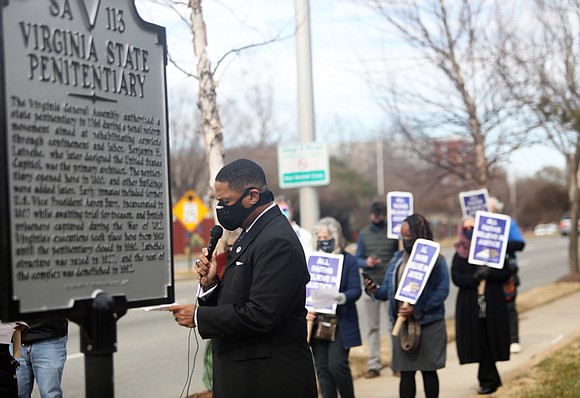Advocates see ending the death penalty as step toward addressing inequity
George Copeland Jr. | 1/28/2021, 6 p.m.

Virginia is on track to become the first Southern state to abolish the death penalty.
With multiple legislation to ban the practice making its way through the General Assembly, supporters of the repeal are working to rally support and to plan for what comes next for handling crimes in Virginia.
“We believe the death penalty will be abolished in Virginia this year,” said the Rev. LaKeisha Cook of the Virginia Interfaith Center for Public Policy during a prayer vigil Jan. 22 at the site of the former State Penitentiary in Richmond. “We will set the pace for the remainder of the states in our country.”
Rev. Cook and other abolition advocates were part of several groups that gathered across Virginia last week to support ending the death penalty. The coalition has centered its efforts around a bill introduced by state Sen. Scott A. Surovell of Northern Virginia that would abolish the death penalty and commute the sentences of the two inmates on Virginia’s death row to life in prison without parole.
The bill passed the Senate Finance and Ap- propriations Committee on a 12-4 vote.
While similar bills have been rejected in past General Assembly sessions, open support for ending the death penalty has only grown since the start of the year. Attorney General Mark R. Herring has indicated his support to end the death penalty, along with several com- monwealth’s attorneys.
A bill supported by Gov. Ralph S. Northam is being co-patroned by Delegate Jay Jones of Norfolk, while similar bills from Delegate Lee Carter of Manassas and Delegate Mike Mullin of Newport News also have been introduced this session.
“It’s time to change the law and end the death penalty in Virginia,” Gov. Northam said during his State of the Commonwealth address. “We’re taking these actions because we value people and because we believe in treating people equitably.”
Death penalty critics also point to the law’s ties to the state’s ugly history with race and slavery and the disparities in who receives the death penalty and for what crimes. A life sentence without parole is viewed by advocates as a more viable alternative, one that would preserve resources, provide more closure for families of victims and allow the opportunity to free the wrongfully convicted.
During a recent news conference held by the Virginia Interfaith Center for Public Policy, several commonwealth’s attorneys, all members of Virginia Progressive Prosecutors for Justice, voiced a willingness to explore options for criminal punishment besides the death penalty or life without parole.
“The first step that we’re trying to do is make sure abolition is made into law,” said Henrico County Commonwealth’s Attorney Shannon Taylor. “I certainly welcome being part of the conversation about the other issues that will automatically touch.”
Ending the death penalty also can be a step toward addressing inequalities in the state’s approach to criminal justice, several prosecu- tors said.
“The disparities inherent in the death penalty are emblematic of disparities in our criminal justice system,” said Fairfax County Commonwealth’s Attorney Steve Descano. “The death penalty is critically important, but it is not the end of this journey. It is the tip of the spear in terms of re-imagining what our criminal justice system should be.”







